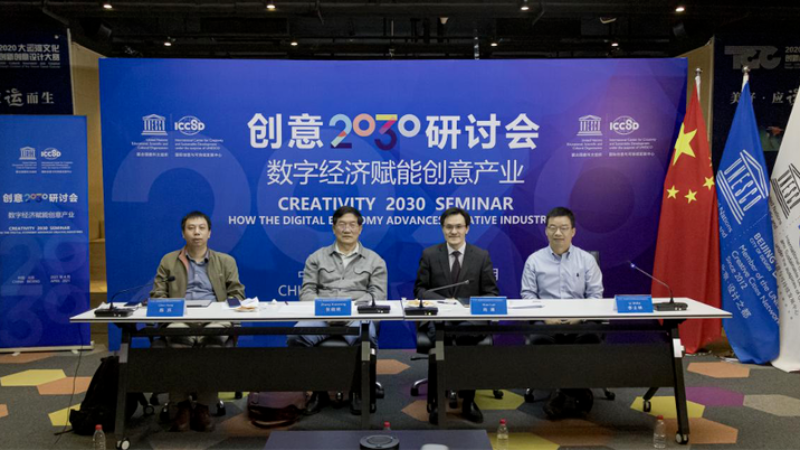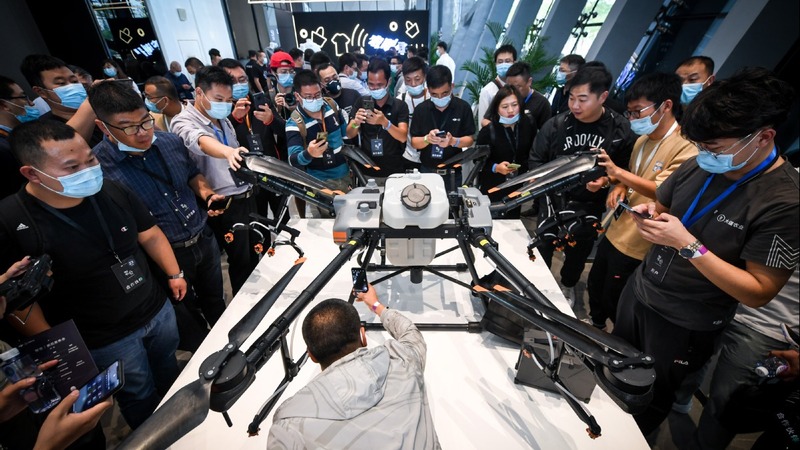On April 29, Plaza of Design, Beijing witnessed CREATIVITY 2030 SEMINAR "How the Digital Economy Advances Creative Industries" hosted by International Center for Creativity and Sustainable Development under the auspices of UNESCO (ICCSD). The seminar was accessible both online and offline. It was intended to analyze the cases of how digital technology promotes the cultural and creative industries during and after the pandemic, explore the role of the new digital cultural industries in the future social activities, economic production and cultural exchanges, as well as discover the opportunities and trends for the growth of such industries in the context of the digital economy.
Xiao Lan, Executive Director of ICCSD was present and delivered a speech. Hans d'Orville, Chairman of ICCSD Advisory Committee and Former Assistant Director-General for Strategic Planning, UNESCO, hosted the seminar. The special participant Professor Shahbaz Khan, Director of UNESCO Beijing Cluster Office, attended the seminar and shared his views. 8 Chinese and foreign guests participated in the international seminar and exchanged their ideas on the two topics, namely "The Role of Creative Industries in the Digital Economy" and "How the Digital Economy and Technology Advances Creative Industries".
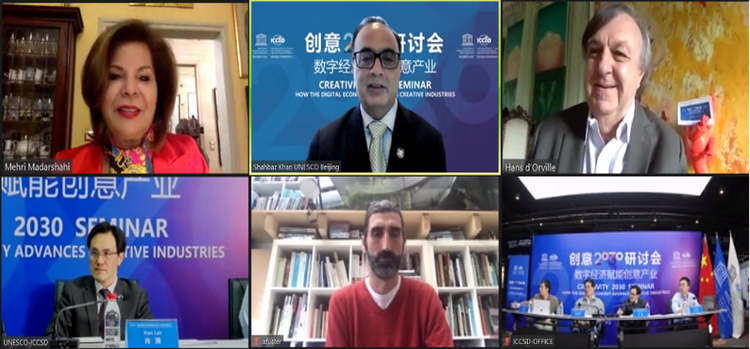
Online Participants of the Seminar
Xiao Lan, Executive Director of ICCSD expressed in his speech that creativity and innovation meant a lot to cities' sustainable development and that such a special meeting was exactly attributed to the rapid growth of digital technology. "Digital technology is undoubtedly one of the most important core technologies in today's society. It has thoroughly changed the way we communicate and interact, the relations between us and the surroundings, as well as the forms in which we present art and culture". He also noted digital technology had provided a new cooperation platform for countries around the globe and maintained the sound operation of cities in the form of virtual reality, especially when the pandemic swept the world for a whole year and real life events had to be suspended in an effort to prevent the spread of the pandemic. Besides, he hoped that this seminar would help promote the development of digital economy by contributing more great ideas on how to regulate digital economy with laws, regulations and policies, how to utilize digital technology in offline ecology and real life, as well as how to support cultural and creative industries with digital economy.
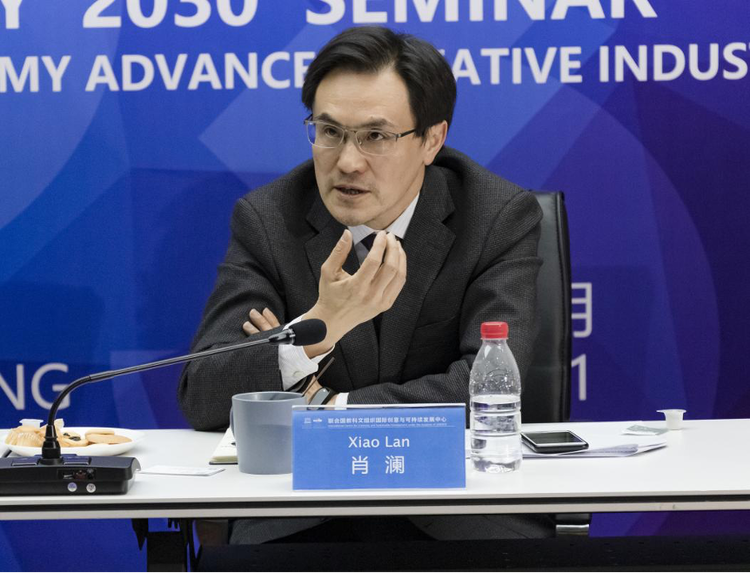
Xiao Lan, Executive Director of ICCSD, delivers a speech.
The special participant Professor Shahbaz Khan, Director of UNESCO Beijing Cluster Office, stated that UN had declared 2021 "the International Year of Creative Economy for Sustainable Development" and UNESCO had also launched an array of themed activities to highlight and enhance the contribution of culture to the global economy and sustainable development. He believed that the pandemic had dealt a heavy blow to the global cultural industry but accelerated the digitalization of cultural content. From 2015 to 2016, the digital sales value of the music industry increased by merely 16 percent in one year, but now the case is different. Internet technology has enabled the public to get closer to and learn about various forms of cultures, thus further stimulating innovation and the creation of new works as well as providing new forms of remuneration for artists and creators. "We need to bring ICT , and I would say the creativity-literate talents into our workforce.", He also mentioned digital economy and creative economy were both of great significance and that the mankind must think globally. Now China has played an irreplaceable role and launched the Belt and Road Initiative, trying to help all in the world. At last, he stressed that ICCSD was surely the non-negligible part of sustainable development, and he looked forward to deepening mutual cooperation.
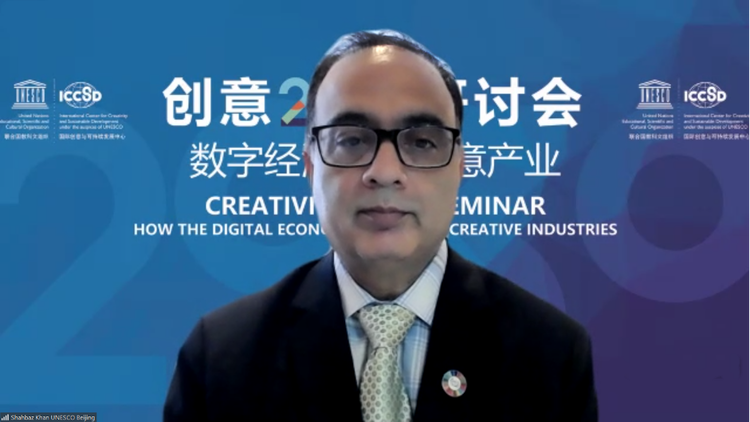
Professor Shahbaz Khan, Director of UNESCO Beijing Cluster Office, attended the seminar online and gave a speech.
In the part of the keynote speech, both Chinese and foreign experts shared their views on the development of digital economy. Hans d'Orville, Chairman of ICCSD Advisory Committee and Former Assistant Director-General for Strategic Planning, UNESCO, analyzed the impact of digital economy on the economic development of the global cultural and creative industries. He stated that the pandemic had undoubtedly impacted the value chain of the global creative industries to some degree while digital economy supported by digital technology was increasingly influencing the economic development of the global cultural and creative industries and helped fulfill the SDGs of UN. "The productivity of national economies is driven ever more by digitally based interconnectedness. All types of creative and cultural activities, performances and products, if generated and driven by digital tools, are an integral part of the creative economy and hence the digital economy." Digital technology enabled all to fully participate in the activities of social development and to get decent jobs, affordable housing, social security, health services, premium resources of education, knowledge and culture, thus promoting the inclusive growth of today's society.
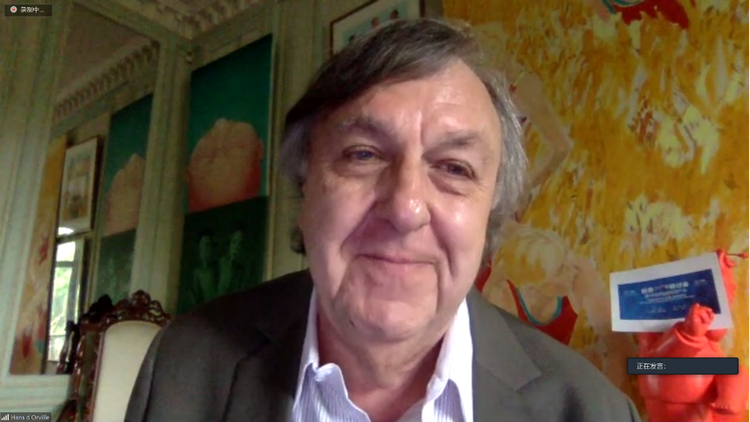
Hans d'Orville, Chairman of ICCSD Advisory Committee and Former Assistant Director-General for Strategic Planning, UNESCO
Mehri Madarshahi, Member of ICCSD Advisory Committee and Former UN Senior Economist pointed out, "Digtalization has been a game changer for the creative economy, impacting the entire creative value chain and changing the way we communicate, create and work. The digital age has also led to a more complex ecosystem with new large tech players, such as Google, Netflix and Amazon, entering the market." She also mentioned that the pandemic had brought unprecedented changes and accelerated economic digitalization. At present, four types of technologies were of great significance, namely Augmented Reality, Virtual Reality, Artificial Intelligence and Blockchain. They would help the mankind build and develop the future creative economy.
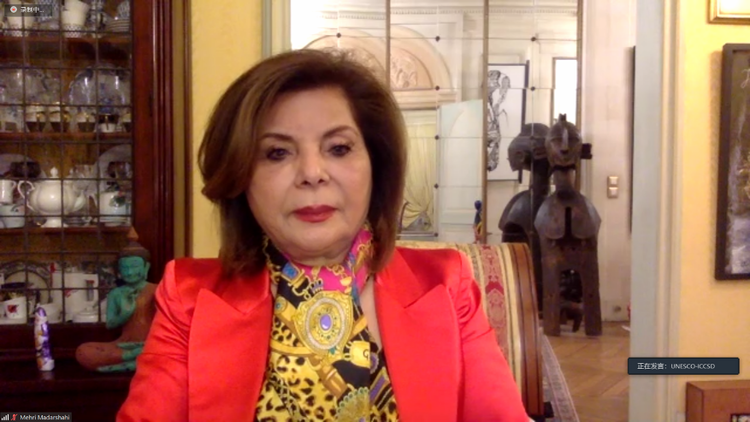
Mehri Madarshahi, Member of ICCSD Advisory Committee and Former UN Senior Economist
Zhang Xiaoming, Member of ICCSD Advisory Committee and Vice Director of China National Center for Culture Studies of Chinese Academy of Social Sciences (CASS), analyzed the "three-new policy" comprised of "New Industries, New Business Forms, and New Business Models". He pointed out that the "three-new policy" in the cultural field showed the logical order of precedence, the logic for promoting the high-quality development of digital cultural industries. "In recent years, great changes have taken place in the development of China's digital cultural industries. A lot of new phenomena and problems appear strange to us since we have never dealt with them before. It's time to deepen the research in such fields, and we must pay close attention to how the traditional policy models and concepts should adapt to the new context."
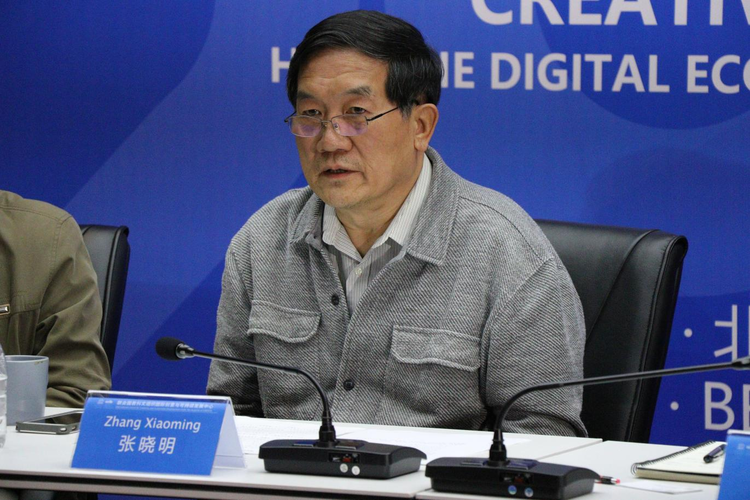
Zhang Xiaoming, Member of ICCSD Advisory Committee and Vice Director of China National Center for Culture Studies of CASS
Albert Fuster, Academic Director of ELISAVA Barcelona School of Design and Engineering, Barcelona, Spain, shared his views from the perspective of education. He said the pandemic forced the global education activities to be conducted online and that the changes should be embraced in a timely manner. He suggested that schools should stay open-minded and interact more with the outside world. They could, with the help of digital technology, develop digitalized education and promote just-in-time learning.
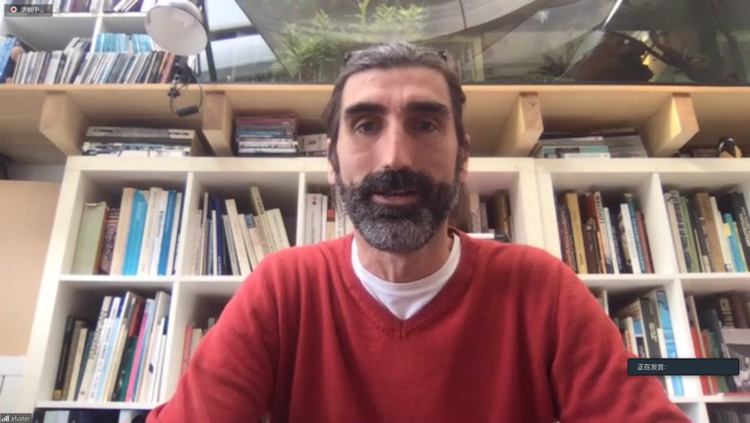
Albert Fuster, Academic Director of ELISAVA Barcelona School of Design and Engineering, Barcelona, Spain
Chen Hong, Deputy Director of Interactive Technology and Experience System Laboratory, Beijing University of Posts and Telecommunications, expressed his views on the present challenges facing cultural exchanges and trade growth, as well as opportunities brought by the digital technology. He deemed that digitalization and long-distance transmission could bring cultural heritage to the communities, closer to the folks. Digital technology had empowered all the parts of our life and production. Notably, technologies including Internet of Things and 5G had helped us better deal with various problems in developing the cultural and creative industries.
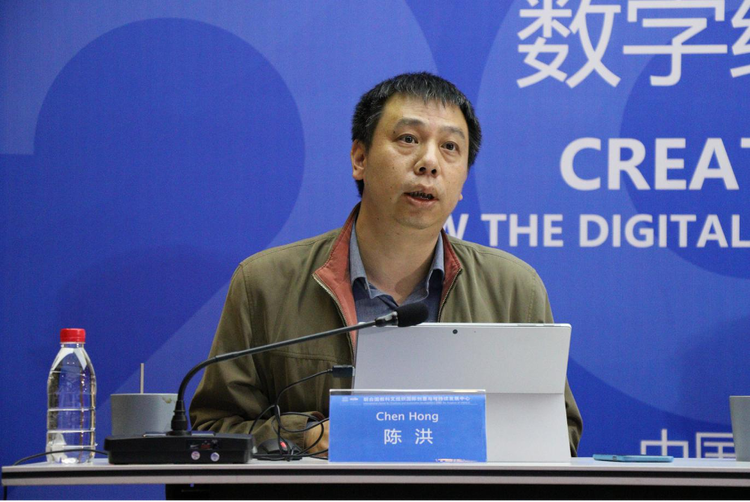
Chen Hong, Deputy Director of Interactive Technology and Experience System Laboratory, Beijing University of Posts and Telecommunications
Li Shilin, Senior Researcher of Tencent Social Research Center (TSRC), shared Tencent's strategies for "Neo-Culture Creativity". He remarked that such strategies had given birth to many new forms and business models covering literature, animation, film & television, music, e-sports, games and other areas, building a variety of creative ecosystems full of creativity and vitality. For example, Tencent had launched the digital App together with the Palace Museum and conducted cooperation with Dunhuang Academy China on the project of "Virtual Tour of the New Digital Silk Road". With the help of digital technology, Neo-Culture Creativity had integrated both the ancient and modern elements, helping preserve and develop traditional culture. Tencent would work together with the government and all the other stakeholders to close the digital divide and reduce digital poverty.
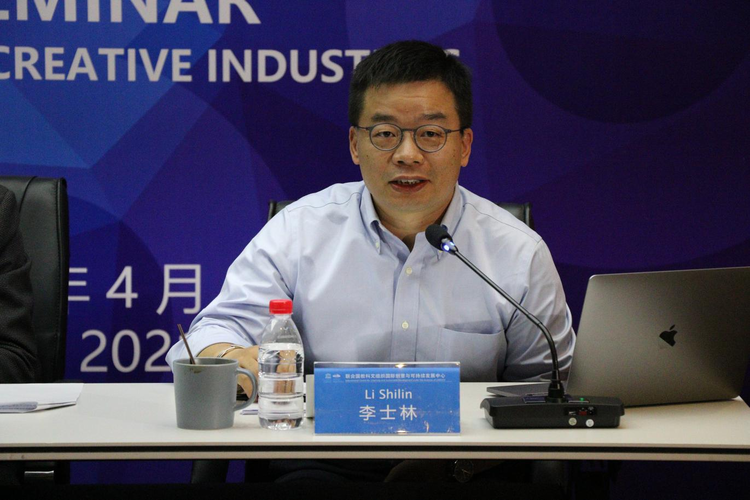
Li Shilin, Senior Researcher of Tencent Social Research Center (TSRC)
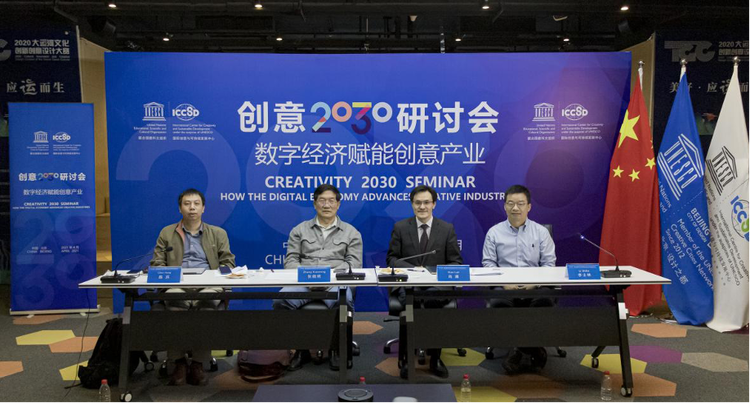
Offline Participants of the Seminar
As the seminar was reaching an end, Xiao Lan, Executive Director of ICCSD, stated digital economy was playing an increasingly important role in the development of global economy and that creative industries were the common wealth of the mankind. ICCSD would fully utilize the international resource strengths of Beijing as the City of Design, and continuously invite experts, entrepreneurs and policy makers in relevant fields to hold more in-depth discussion.
